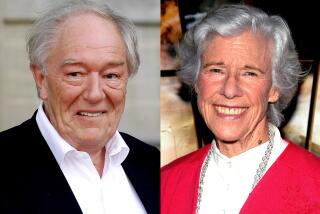STAGE REVIEW : ‘Sanctified’: Last Day of Zora Hurston
- Share via
If Zora Neale Hurston were enjoying a physical resurrection to match the recent revival of interest in her work, there’s a good chance she’d approve strongly of it all--from “Color Purple” poet-novelist Alice Walker’s placement of a marker on Hurston’s unmarked grave (the first step, taken in the ‘70s), to playwright George C. Wolfe’s boisterous dramatization of her short stories (“Spunk”), to the more straightforward biography shown months ago on PBS.
But Ellen Sebastian’s “Sanctified,” a multi-media evocation of Hurston’s last day in the world, might have given her the greatest pleasure and the greatest pause.
How true the show at the Temporary Contemporary is to the real Zora is almost beside the point. It provides an impression--a kind of ritualized flashback to selected moments in her life that invokes gospel and voodoo, touches lightly on biography, serves up fragments of her search for Afro-American cultural iconography and sauces up the whole with Hurston’s rich capacity for humor and colloquialism.
The 90-minute piece would have set her laughing--much as it does Esther Scott, the impressive actress who plays Hurston here with contagious fullness and abandon, but who never underestimates the lingering pain below. “I’m a train,” she tells us early on, “travelin’ on the fast tracks of my life.”
Fact is not what one turns to Sebastian’s piece for. Flavor is. Impressionism--and quite abstract at that. In life, Hurston, a prominent figure in the Harlem Renaissance circles of the 20s, was both courageous and outrageous, serious and eccentric. An anthropologist by training, a folklorist by profession, she was inspired as a writer to liberally use lip-smacking black American in her stories.
Sebastian’s “Sanctified” opens with titles superimposed on a scrim, movie-like. It separates the present from the past, if not always the real from the imagined. We find Hurston herself on the sand at Eau Gallie, Florida, in front of the crumbling shack where she had lived at various times and where she has returned. A spider web blocks the entrance to the shack. Hurston talks to the spider.
But we are quickly plunged into the world that was her life. On the scrim are Voodoo symbols and designs. Behind the scrim are other influences--a gospel choir on the one hand, Voodoo musicians and Mambo dancer (Shakiri) on the other. We see the context of her life: a shifting panorama that repeatedly includes a patronizing patron (Janeen Wyatt), a white anthropologist (Malcolm Wood), her father (Artis Fountain) and her mother (Margarette Robinson).
The mother, who encouraged her to be unafraid, died when Hurston was nine, telling her daughter to get “all the education you can because, baby, that’s the onliest way you can keep from under people’s feet.”
Ceremony and symbolism abound, starting with Hurston carefully removing books and a pillow, a looking-glass and a clock from an old suitcase on the sand--an echo of her dying mother asking her to not allow anyone to take the pillow from under her head, or cover up the mirror or the clock after her death. It is picked up again when the time comes for Hurston’s own death. (“Father, I’m coming home; Holy Ghost, don’t leave me . . . “)
Sebastian, a co-founder of San Francisco’s Life On the Water, is the imaginative creator and director of “Sanctified” (written by Marilyn Waterman), though that invention slips in the last 30 minutes when repetition begins to set in. Jack Carpenter’s lights and Grant Ditzler’s set and props use levels and distance to fine effect, making a visceral contribution to the emotional tone of the piece.
But it is Scott’s bonhommie and performance as the irrepressible Hurston that ultimately holds us in thrall. (A word of warning: seating is on bleachers with no backs--and there is no intermission.)
At 152 N. Central Ave., 8 p.m., through Sunday. $12; (213) 626-6222.
More to Read
The biggest entertainment stories
Get our big stories about Hollywood, film, television, music, arts, culture and more right in your inbox as soon as they publish.
You may occasionally receive promotional content from the Los Angeles Times.










